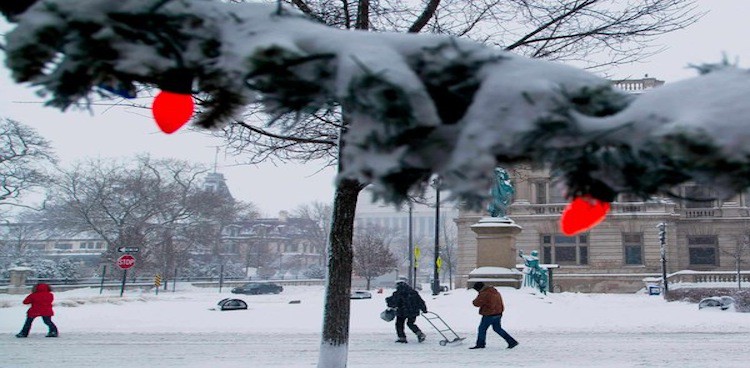
As much as we would all like to deny it, winter is coming. And with winter come snowstorms, icy roads, and overall dangerous conditions outdoors. Over the years, we’ve learned to combat these conditions as best as we can, but this is more difficult in some areas than others.
Last year, though, Wisconsin came up with a possible answer to this problem. It is both not what you’d expect and exactly what you’d expect (given the fact that this happened in Wisconsin): use cheese to make the roads less icy. And, believe it or not, it actually works.
According to Emil “Moe” Norby, technical support manager for the Polk County Highway Department, a mixture of the waste leftover from cheesemaking and traditional road salt “makes [the roads] go down to a lower freezing point,” meaning it takes them longer to freeze.
“During the winter I placed a 12-ounce container of the salt brine outside and found it did not freeze until we had two consecutive days of 21 degrees below zero,” Norby said of the mixture in an interview with National Public Radio. This means that, even on the coldest days of a Wisconsin winter, this would help the roads take longer to freeze. It also helps the rock salt stick to the road, as opposed to bouncing off, which Norby says results in losing about 30 percent of the rock salt.
In addition to being effective, it is also a very economical choice, at least in the state of Wisconsin. According to The New York Times, Wisconsin produced 2.7 million pounds of cheese in 2012, the most in the United States. By using the leftover liquid on the roads, F & A Dairy products in northern Wisconsin saved about $20,000 in hauling costs.
In contrast, Milwaukee alone spent $6.5 million dollars on snow and ice management in 2012, and that was with only 28 inches of snow. The salt and cheese brine only costs the city about $6,500 dollars to store and transport, saving the city a significant amount of money each year, even with the limit of only using eight gallons of the brine per ton of rock salt.
On top of being cost-efficient, using cheese brine is also better for the environment. It leaves less residue than the rock salt, leading to less overall pollution.

Milwaukee salt trucks are being outfitted with side-tanks filled with brine. Photo Credit: NPR
So which cheeses work best in the brine? According Jeffrey A. Tews, manager of the public works department in Milwaukee, provolone and mozzarella are your best bet.
“Those have the best salt content,” Tews says. “You have to do practically nothing to it.”
All of these things seem great, but that doesn’t mean there aren’t risks. Will the cheese attract rodents? Will it leave boot stains all over the home (which has been a problem with previous snow-prevention concoctions)? The main issue, though, is the smell.
“It has a slight odor when you handle the product,” Norby says. “If you were behind a snow plow, you’d immediately smell it.”
However, this isn’t a problem for Ghassan A. Korban, another public works worker in Milwaukee.
“We never look down or get that close [to the brine]” says Korban. “If you can’t smell it from this height, then you won’t smell it.”
Regardless of the smell, though, the city of Milwaukee has big plans for this brew.
“If this takes off, if this proves to be a success here, I’m sure that it will be used in cities all over the country,” says local alderman Tony Zielinski.
So who knows? Maybe next year your roads will be paved with cheese this coming winter, or a winter in the near future. It could save your city money, help the environment, and keep you safe while you’re driving. And would having the roads smell like cheese be so bad? Probably not.
Photo Courtesy of the New York Times


